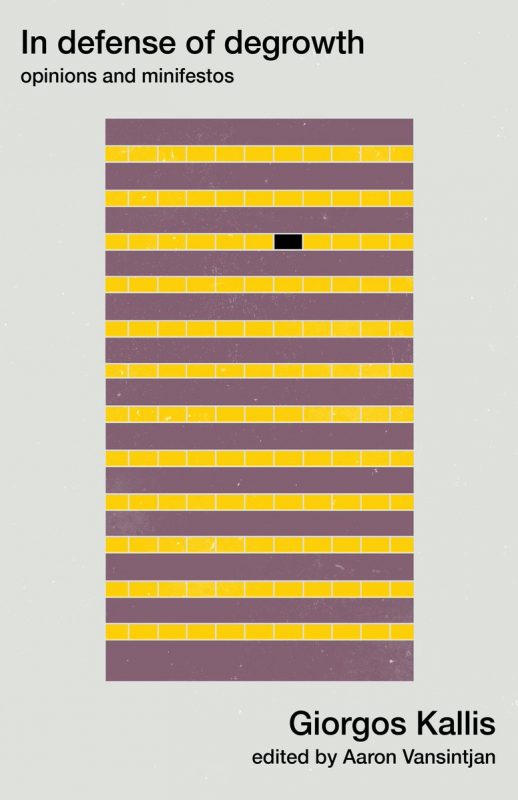Reading in the literature of degrowth, I find much to be charmed by, not least the following quote from In Defense of Degrowth, the 2017 collection of writings by degrowth scholar and advocate Giorgos Kallis. The quote–and I’ll get to it in just a moment–comes from a passage in which Kallis is speaking of degrowth’s “call for sobriety.”
We should note, first off, that it isn’t the call for sobriety itself that’s unusual. We must shrink our carbon footprints, fly less, walk more, eat less beef, and so on. Familiar, too, is how easily an agenda of this sort can be dismissed as backwardness and nonsense. People simply aren’t going to give up their … well, their anything. That’s the argument against sobriety, more or less, and it’s just about rock solid.
No, what’s striking about the call for sobriety from this degrowth perspective is what we’re being asked to give up. “Our claim for sobriety,” Kallis writes, “is based on the premise that finding the meaning of life individually is an anthropological illusion.” What charms me about this quote, and about degrowth in general, is how it engages and not only our material but also our semiotic modes. This isn’t about giving up air conditioning and cars. It’s about giving up what many have called the very point of it all.
finding the meaning of life individually is an anthropological illusion.” What charms me about this quote, and about degrowth in general, is how it engages and not only our material but also our semiotic modes. This isn’t about giving up air conditioning and cars. It’s about giving up what many have called the very point of it all.
How familiar is degrowth to the readers of this forum? That’s unclear to me. A search for the term here at the blog turned up no hits. I don’t know–some introduction may be in order. Degrowth is a body of critical theory and a research agenda. It responds to two simple realities: 1) the conditions of our environment are rapidly deteriorating, and 2) the ‘grow or die’ imperative, which practically all economists and politicians accept as the solution to our problems, is in fact the primary cause. Degrowth is also an investigation and a provisional encouragement of those local and regional experiments, going on in various parts of the world, in exiting the growth economy. The degrowth perspective is organized around the values of sufficiency, simplicity, conviviality, and sharing–not the value of individual material accumulation.
Nor of semiotic accumulation, as it were. Degrowth insists that meaning is collective, and that decisions about “the meaning of life” are not merely private decisions made by individuals, but collective, political decisions. I read it this way: It’s not the individual’s responsibility to grow and dispense with their own economic surplus. Nor is the individual responsible for securing their own answer to what’s it’s all about. The environment can’t sustain the former, and the psyche can’t sustain the latter. In which case people ought “to take themselves less seriously,” Kallis writes, “and enjoy living free from the unbearable weight of limitless choice.”
I’m a little uneasy, in regard to those who haven’t heard of this movement, introducing it in this way. The quote I selected doesn’t reflect the central focus of degrowth thinking. The passage it was taken from–only one of many that set my mind turning–was something of a digression, in fact. But so many of the questions in my own work concern the power of the dominant imaginaries, as well as where, how, and whether they might be challenged. How lightly, I thought, this degrowth perspective tosses off the modern quest for meaning!
And make no mistake–it’s a lot to toss off. Having assigned my World Civ students an excerpt from The Communist Manifesto, I dipped into a book I hadn’t read since the eighties, Marshall Berman’s All that is Solid Melts into Air, the 1982 classic on modernization and modernism which takes its title from the famous passage in the Manifesto. What stood out to me, even more strongly than when I first read it decades ago, is how Berman both praises  and bemoans “the development ideal” as the driver of modernization. By development, he means growth, that perpetual churn of destruction and renewal that Marx and Engels identified as the dynamic of the bourgeois revolution.
and bemoans “the development ideal” as the driver of modernization. By development, he means growth, that perpetual churn of destruction and renewal that Marx and Engels identified as the dynamic of the bourgeois revolution.
Yet as he reads Marx and Goethe as modernist texts, Berman hastens to characterize that growth as an aspect of something more general. Humankind’s “insatiable desire for growth” is “not merely for economic growth but for growth in experience, in pleasure, in knowledge, in sensibility.” That defining insatiability drives us ever upward and onward. Granted unlimited powers by Mephistopheles, Goethe’s Faust quickly burns through the thrills of hedonism, destroying the lives of those he loves along the way. Faust then commits those powers to bettering society with a massive Robert Moses-like makeover. He sets out to become the kind of hero Ayn Rand would later champion in a lower literary register: a builder of great projects of infrastructure. When human insatiability takes economic expression, growth for growth’s sake is the inevitable consequence. Now it isn’t just a few loved ones who are destroyed. Whole societies and ecosystems are bulldozed and shoveled over, mobilized, reintegrated, and then bulldozed and shoveled over again.
Berman wants to see human expansiveness not only as instinctive but as fundamental. Constant metamorphosis, driven by insatiability, is to be “more alive.” In Berman, and in our dominant modern imaginary, the dynamic of modernization is justified by perceiving it as but an expression of the dynamic of the life process itself. “To say that our society is falling apart is only to say that it is alive and well.” This is the modernist insight. There is no endpoint to growing, and there is no endpoint to knowing, and so the modern search for meaning becomes an endless quest. Valorized in this way, human insatiability reaches the level of tragedy. The “deepest horrors” of modernization spring from our “most honorable aims” and our “most authentic achievements.” Yet they lead to a condition, both material and spiritual, in which all that is solid melts into air.
Melt may not be the right verb, however. As the economic reinforces the semiotic, and the semiotic reinforces the economic in turn, burn or combust may be more fitting. I keep flashing on the recurring image of explosive flames, roaring and filling the screen, that I remember in David Lynch’s film, Wild at Heart. I read this image as unconstrained vitality. Life is a wild, broiling churn at its heart, driven by desire, dangerous and free.
This is dramatic, but is it accurate? Sure we have dreams of expansiveness, but we have other dreams, too: of peace, justice, laughter, generous relations, and communities of calm and sustained prosperity. So why not, as an image of core vitality, a recurring one from a later film: the shimmering, slowly turning, three-dimensional cosmos of light in Terrence Malick’s The Tree of Life? This would represent not the combustion of order, but its opposite–a set of ordering principles, perhaps.
The degrowth folks might, as I do, prefer the latter image. On the other hand, if they found Malick’s aesthetic a tad too heavy, they certainly wouldn’t be the first. They might instead reach for something more transparently convivial. Berman argues that “the wounds of modernity can only be healed by a fuller and deeper modernism.” “Modern men and women must learn to yearn for change,” he writes, but his construction doesn’t allow them any objective for change except to better surf the same wave of endless development. Is there no exit from this central, self-reinforcing dynamic? “Sure, there is!” the degrowthers say.
We can get into the nitty gritty of their ideas, but what’s the secret of their lightness? Maybe it comes from the lack of strain it would otherwise take to avoid, as the vast majority of others avoid, the obvious fact staring them in the face, supported by a body of evidence before them like an immense leviathan lying dead on the beach: perpetual growth as an ideal is absurd. Magical thinking takes a lot of energy! Yet it’s that thinking on which the world now turns and which is driving our economic and semiotic ways of being into runaway.

5 Thoughts on this Post
S-USIH Comment Policy
We ask that those who participate in the discussions generated in the Comments section do so with the same decorum as they would in any other academic setting or context. Since the USIH bloggers write under our real names, we would prefer that our commenters also identify themselves by their real name. As our primary goal is to stimulate and engage in fruitful and productive discussion, ad hominem attacks (personal or professional), unnecessary insults, and/or mean-spiritedness have no place in the USIH Blog’s Comments section. Therefore, we reserve the right to remove any comments that contain any of the above and/or are not intended to further the discussion of the topic of the post. We welcome suggestions for corrections to any of our posts. As the official blog of the Society of US Intellectual History, we hope to foster a diverse community of scholars and readers who engage with one another in discussions of US intellectual history, broadly understood.
Thanks for this Anthony. I hadn’t heard of the degrowth movement as such but it sounds like it has its lineage in Schumacher’s, “Small is Beautiful” or even Ehrlich’s, Population Bomb from the 70’s? As I recall it focused on the unsustainable growth required of capitalist economies.
You are right, Paul–Schumacher is most definitely in degrowth’s lineage.
Schumacher was significant in my early theo-political formation. Still believe “Small is beautiful.” What economists understand as the diseconomies of scale which so many of our institutions are suffering from. Giantitis, too big to not fail. Great essay!
I hadn’t heard of “degrowth” as a term until this post. Thanks for enlightening me, Anthony. – TL
Anthony, you might be interested in an article I wrote, which balances degrowth and Berman-inspired accelerationists.
unevenearth.org/2017/01/accelerationism-and-degrowth/